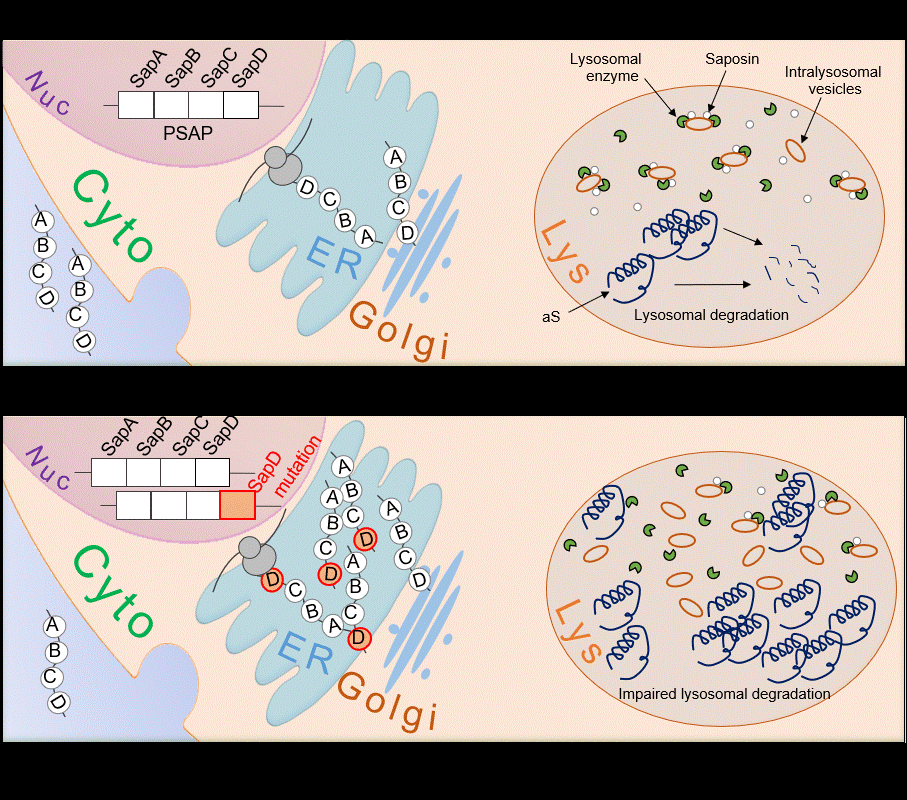Category: Parkinson's Disease: Genetics
Objective: To investigate whether the variants of prosaposin can be linked to Parkinson’s disease (PD) [1].
Background: Recent growing investigations have promoted the evidence of genetic association between lysosomal storage disorders (LSDs) and PD [2], which has been arisen from the discovery of Gaucher disease-causing GBA1 mutations as a genetic risk factor for PD [3]. Besides GBA1, other causative genes for sphingolipidoses such as Krabbe disease, metachromatic leukodystrophy, Niemann Pick disease, and Farber lipogranulomatosis, have been also implicated in PD [4]. Thus, ceramide or sphingolipid degradation pathways might be involved in the pathomechanisms of PD. Deficiency of each saposin can also cause LSD with accumulation of ceramide or sphingolipids [5]. However, it has been unclear whether the prosaposin gene (PSAP), which encodes a precursor protein of four saposins, can be involved in PD [6].
Method: Genetic mutation screening was performed to identify PSAP mutations from 290 patients with autosomal dominant or recessive inherited PD. Whole exome sequencing (WES) study was performed in patients with autosomal dominant PD with PSAP mutations. Case-control association study was performed in 1105 patients with sporadic PD from Japan and Taiwan. Skin fibroblasts and induced pluripotent stem cell (iPSC)-derived dopaminergic neurons, which were obtained from PD patients with PSAP mutations, were generated. Autophagy-lysosomal system and alpha-synuclein (aS) were analyzed in skin fibroblasts and iPSC-derived dopaminergic neurons. Mice with the saposin D domain mutation in PSAP were generated. Behavior tests and immunohistochemical analysis of the mice were performed.
Results: Genetic mutation screening identified three pathogenic PSAP heterozygous mutations that were in exons encoding the saposin D domain from three families of autosomal dominant PD. WES study revealed no mutations in other PD- or LSD-causing genes. Case-control association study revealed two intronic variants around saposin D domain-coding exons in PD with statistically different allele frequencies. Analysis of patient-derived cells revealed accumulation of autophagic vacuoles, impaired autophagic flux, and aS aggregation. Mice with heterozygous and homozygous PSAP C509S mutations showed progressive motor decline and had dopaminergic neurodegeneration in the substantia nigra.
Conclusion: Variants in the saposin D domain of PSAP can be linked to PD.
References: [1] Oji et al. Brain 2020 [2] Robak et al. Brain 2017. [3] Sidransky et al. NEJM 2009. [4] Ysselstein et al. Mov DIsord 2019. [5] Kishimoto et al. J Lipid Res 1992. [6] Ouled Amar Bencheikh et al. Neurobiol Aging 2018.
To cite this abstract in AMA style:
Y. Oji, T. Hatano, S. Ueno, M. Funayama, K. Ishikawa, A. Okuzumi, S. Noda, S. Sato, W. Satake, T. Toda, Y. Li, T. Hino-Takai, S. Kakuta, T. Tsunemi, H. Yoshino, K. Nishioka, T. Hattori, Y. Mizutani, T. Mutoh, F. Yokochi, Y. Ichinose, K. Koh, K. Shindo, Y. Takiyama, T. Hamaguchi, M. Yamada, M. Farrer, Y. Uchiyama, W. Akamatsu, J. Matsuda, Y. Wu, N. Hattori. Variants in the saposin D domain of prosaposin gene are linked to Parkinson’s disease [abstract]. Mov Disord. 2020; 35 (suppl 1). https://www.mdsabstracts.org/abstract/variants-in-the-saposin-d-domain-of-prosaposin-gene-are-linked-to-parkinsons-disease/. Accessed February 23, 2026.« Back to MDS Virtual Congress 2020
MDS Abstracts - https://www.mdsabstracts.org/abstract/variants-in-the-saposin-d-domain-of-prosaposin-gene-are-linked-to-parkinsons-disease/

